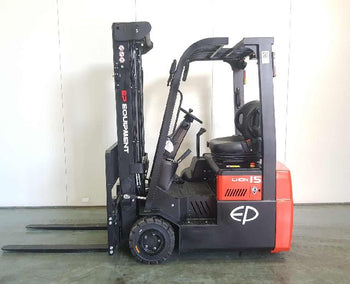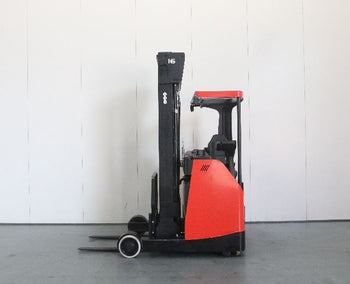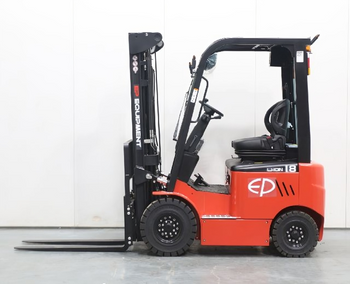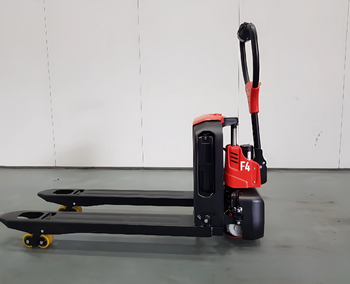Electric forklifts have become the backbone of warehouses, distribution centres and manufacturing plants in the UK. Rising fuel costs and stricter emissions standards have accelerated the shift from diesel to electric power. Lithium‑ion batteries are now powerful enough for multi‑shift operations and produce zero tail‑pipe emissions. However, the cost of a brand‑new electric forklift can easily consume a significant portion of a business’s capital.
For budget‑conscious businesses, used electric forklifts – often called ex‑demo or ex‑rental units – provide a compelling alternative. They give companies access to reliable machines at a fraction of the price of new models. This article explores the pros and cons of buying used or ex‑demo electric forklifts, looks at cost savings and warranty considerations, and offers practical guidance for choosing the right truck. It also highlights how iLift, an EP‑equipment specialist based in the UK, supports customers with competitively priced ex‑demo forklifts and pallet trucks.
New vs Used Electric Forklifts
When deciding between a new and a used electric forklift, cost is usually the first consideration. New electric warehouse trucks typically cost £12,000–£20,500 (converted from US dollars) for a 3‑ to 4‑tonne capacity unit. By contrast, a similar used electric forklift usually sells for £4,000–£8,000. In other words, used units are generally 25–50 % cheaper than new ones, saving thousands of pounds and freeing up capital for other needs.
However, price is only one factor. According to Clark Material Handling’s buying guide, new forklifts come with the latest technology, improved safety features and manufacturer warranties. They also tend to offer better fuel efficiency and hold their resale value longer. On the other hand, used forklifts are immediately available and provide cost‑effective solutions without long lead times. Clark emphasises that the best choice depends on your organisation’s budget, operating demands and long‑term goals.
Why Buy an Ex‑Demo or Used Electric Forklift?
Lower Upfront Cost and Faster ROI
The primary reason companies choose used trucks is the significant price difference. A blog from Value Forklifts explains that used electric forklifts cost 25–50 % less than comparable new models. Used electric forklifts rated at 3,000–4,000 lb (approx. 1.5–2 tonne) typically sell for £4,000–£8,000, while a new model of similar capacity costs £12,000–£20,500. Lower prices free up capital for hiring staff or expanding inventory.
Reduced cost also accelerates return on investment. Since the initial outlay is smaller, businesses often recoup the cost of a used forklift within months, especially in seasonal or light‑duty operations. This allows them to reinvest in other assets sooner.
Avoiding Rapid Depreciation
New forklifts lose a significant portion of their value as soon as they leave the showroom. Value Forklifts notes that a new forklift can depreciate by 20–25 % in its first year. A used forklift has already gone through this steep depreciation stage, so its value is more stable. CFE Equipment’s article echoes this point, stating that buying used mitigates the financial hit from rapid depreciation and helps maintain the asset’s value over time.
Immediate Availability and Diverse Selection
Lead times for new forklifts can be lengthy – sometimes several months. Used forklifts, on the other hand, are ready to go. CFE highlights that used units allow businesses to address material‑handling needs immediately. This is particularly valuable during peak seasons or sudden increases in demand. Another advantage is the diverse selection available in the used market. From counterbalance trucks to narrow‑aisle reach trucks, businesses can find models tailored to specific applications. This variety also enables flexibility in customising equipment with attachments or ergonomic features.
Lower Insurance and Operating Costs
Insuring a used forklift typically costs less than insuring a new one. Lower premiums reduce ongoing overheads and improve the business’s cost structure. Operating an electric forklift is also cheaper than running internal‑combustion trucks. According to Value Forklifts, electric models cost about £0.80–£1.60 per charging cycle, while internal‑combustion forklifts can consume fuel costing £3–£5 per hour. Electric forklifts also have fewer moving parts, reducing servicing costs over time.
Sustainability and Circular Economy Benefits
Buying used supports sustainability by extending the lifecycle of existing equipment. EP Equipment, a major forklift manufacturer, recently introduced the Green Range – a product line built around remanufactured trucks. Instead of building completely new machines, EP converts old diesel forklifts into lithium‑powered electric units. The process reuses chassis and counterweights, dramatically reducing the energy and raw materials required to produce new equipment. The Green Range is aimed at cost‑conscious buyers looking for essential functionality and limited warranty support. This approach illustrates how buying remanufactured or ex‑demo equipment not only saves money but also reduces the carbon footprint associated with manufacturing new forklifts.
Flexibility and Easier Negotiations
Used equipment is often easier to negotiate on price. CFE notes that negotiating the price of a used forklift can be more flexible than negotiating a new one. The used market also allows businesses to test specific models before committing to buying new equipment later. This “try before you buy” approach can inform future purchasing decisions and reduce risk.
Better Cash Flow in Uncertain Times
During economic uncertainty, protecting cash flow is crucial. Opting for used forklifts lowers capital expenditure and reduces monthly finance payments. If economic conditions change, the business is less exposed because the equipment cost is already covered. Lower risk encourages greater agility, enabling businesses to pivot operations without large outstanding debts on brand‑new equipment.

Risks and Considerations When Buying Used
Higher Maintenance and Unknown History
While used forklifts are cheaper, they often require more maintenance. Value Forklifts warns that older components may need frequent repairs; batteries may cost £1,600–£4,100 to replace and hydraulic work can cost £650–£2,050. Without service records, it is hard to know how well a used forklift was maintained. CFE adds that hidden issues may only appear after purchase, and used forklifts generally depreciate faster than new ones.
Limited Warranty Coverage
A major benefit of new forklifts is warranty coverage. Clark notes that new units typically include a manufacturer warranty covering major repairs. By contrast, used forklifts may come with limited or no warranty. Total Industries’ guide advises that a reputable seller should at least offer 30 days parts and labour coverage and a six‑month powertrain warranty. Shorter warranties transfer more repair risk to the buyer, so it is essential to choose a trustworthy dealer and consider extended warranties.
Outdated Technology and Safety Features
Used forklifts may lack modern safety systems such as stability control, reverse‑view cameras or telematic monitoring. Value Forklifts lists outdated safety features as a potential risk. Clark’s article emphasises that newer models often come with ergonomic designs and advanced safety systems that improve operator comfort and productivity. When comparing used and new options, businesses must weigh whether missing technology could compromise safety or efficiency.
Lower Resale Value and Shorter Lifespan
Used forklifts, particularly older models, will depreciate faster and command lower resale values. They may also have shorter remaining lifespans because many hours of operation have already been logged. This factor is less significant if the forklift is intended for short‑term or seasonal use, but it should be considered for long‑term investments.
How to Choose a Quality Used Electric Forklift
Because used equipment can vary greatly in condition, buyers should perform due diligence before purchase. Associated University (a learning resource in the material handling industry) provides a set of recommendations for inspecting a used electric forklift:
-
Inspect the battery: The battery is the heart of an electric forklift. A well‑maintained battery can last around five years. Check battery age, maintenance records, signs of corrosion and electrolyte levels. Consider performing a load test to gauge capacity and health. Replacing a battery is costly, so battery condition is critical.
-
Check total operating hours: The hour‑meter indicates the forklift’s remaining life. A truck with fewer than 10,000 hours generally has some life left, while one with more than 10,000 hours may need more frequent repairs. Also consider whether the forklift was used for light‑duty or heavy‑duty work.
-
Review maintenance history: A well‑documented service record shows that the forklift was properly cared for. Look for evidence of planned maintenance programmes and regular servicing.
-
Inspect physical condition: Examine the forks, mast, lift chains and tires for cracks, bends or excessive wear. Minor scratches are acceptable, but structural damage can compromise safety.
-
Test drive the truck: A short test drive reveals how the forklift handles and whether there are unusual noises. Test the brakes, steering and lifting mechanism to ensure smooth operation.
-
Assess suitability: Ensure the forklift’s lifting capacity, mast height and aisle width fit your operations. Consider attachments like side shifters or fork positioners if needed.=
-
Evaluate the seller: Purchasing from a reputable dealer reduces risk. Dealers often offer warranties, financing options and service contracts.
Ex‑Demo and Used Electric Forklifts at iLift
iLift is a UK‑based dealer specialising in lithium‑ion forklifts and pallet trucks from EP Equipment. All iLift pallet trucks are LOLER certified and inspected by an accredited engineer. The company provides global shipping and can assist with maintenance and repairs. iLift’s equipment is fully electric, offering zero emissions, low noise and sensitive driving characteristics.
Electric Pallet Trucks
iLift stocks a comprehensive range of electric pallet trucks. The EPL185 Ex‑Demo Model, which handles 1,500 kg to 1,800 kg, costs £1,750.00 excluding VAT. The higher‑capacity EPT WA Series can lift up to 2,500 kg and starts from £6,000.00. For heavy‑duty applications, the KPL201(H) pallet truck with a 2,000 kg capacity costs around £7,500.00. These models use lithium‑ion batteries and are eco‑friendly, low‑noise and easy to maneuver. Pallet trucks save space and are cheaper to maintain than traditional forklifts. Additionally, electric pallet trucks allow operators to move much more weight compared with manual pallet trucks: manual units typically carry under 600 kg, whereas electric models can handle up to 2,000 kg.
Ex‑Demo Forklifts
For businesses seeking higher lift capacities, iLift offers ex‑demo electric counterbalance and reach trucks at significant discounts. The CPD15TVL Ex‑Demo forklift with a 1.5‑tonne capacity and triplex mast is priced at £12,500. A larger CPD50L1 Ex‑Demo forklift with an 80 V/540 Ah battery and a 4.5–5 tonne capacity is available for £39,500. Even the heavy‑duty EFL702 Ex‑Demo with a 7‑tonne capacity is listed at £57,000. These prices illustrate how ex‑demo trucks cost well below their new equivalents, while still benefiting from lithium‑ion technology. iLift also sells ex‑demo pallet trucks like the F4 Pallet for £800 and the EPL154 Ex‑Demo model for £1,499.

Why Choose iLift?
Besides competitive pricing, iLift prides itself on quality and support. All equipment is LOLER certified and inspected before sale. The company can ship equipment worldwide and provides maintenance support. iLift stocks EP pallet trucks, a leading brand in lithium‑ion technology, ensuring reliable performance and long battery life. Customers can choose from a variety of capacities and configurations to match their requirements. For businesses seeking to rent rather than buy, iLift rents out any pallet truck available for sale.
iLift Solutions for Your Business Needs
If you are considering a used electric forklift, explore iLift’s ex‑demo and used lithium‑ion truck selection. These machines offer significant cost savings and reduce your environmental footprint while delivering the performance you need. Visit iLift’s Used Lithium‑Ion Trucks – Specials Offer page to view current deals and contact the team via their enquiry line (01600 800 800) or email (enquiry@ilift.co.uk). For businesses looking to streamline warehouse tasks with lighter equipment, browse iLift’s Electric Pallet Trucks to find the right model based on battery technology, lift capacity and application.
Conclusion
Buying a used electric forklift can be a smart move for cost‑conscious businesses. Used or ex‑demo machines offer substantial savings, faster return on investment and immediate availability. They help avoid rapid depreciation and support sustainability through the reuse of existing equipment. However, buyers must carefully inspect the battery, operating hours and maintenance history, and they should expect shorter warranties and potential maintenance costs. Partnering with a reputable dealer such as iLift provides peace of mind.iLift offers LOLER‑certified equipment, global shipping, maintenance support and a wide range of EP‑brand pallet trucks and forklifts.
By weighing the pros and cons and evaluating your specific operational needs, you can determine whether a used electric forklift is the right choice. For many businesses in the UK, the answer is yes: used electric forklifts deliver robust performance at a price that makes economic sense.











